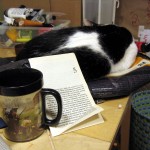The pleasures of reading mass-market literature extend to the
simplicity with which you can excerpt your favorite parts for later
commentary. As you can see from the first attached picture, forty-nine
out of the 50 chapters of Michael Connelly’s Void Moon remained
in the airplane where I read them. I saved chapter 5, which has the
best writing in the entire book.
The list can function as a shortcut to good writing. It’s all nouns,
and no prescriptivist, not even Elmore Leonard, would suggest that you could improve your
writing by leaving the nouns out. A good list creates a minimal,
dynamic, ready-for-action mood, quite like the mood of Void
Moon that this chapter introduces. Cassie Black has decided to
rededicate her life to crime. Connelly provides one last simile
(though he confuses the role of arteries and veins) before crossing
the Rubicon into list territory:
The charge of outlaw juice was boiling in her blood now, banging through her veins like hot water through frozen winter pipes.
She began by changing her body clock, dramatically shortening her sleeping hours and pushing them well into the morning. She offset the sleep deprivation with a regimen of energy-enhancing vitamins…Within a week she had dropped from seven to four hours of sleep per night.… After carefully making a list of every conceivable thing that would help her overcome any obstacle on a job, she memorized its contents and destroyed it… She bought screwdrivers, iron files, hacksaw blades and hammers; baling wire, nylon twine and bungee cords. She bought a box of latex gloves, a small tub of earthquake wax, a Swiss Army knife and a painter’s putty knife with a three-inch-wide blade. She bought a small acetylene torch and went to three hardware stores before finding a small enough battery-powered and rechargeable drill. She bought rubber-tipped pliers, wire cutters and aluminum shears. She added a Polaroid camera and a man’s long-sleeved wetsuit top to her purchases. She bought big and small flashlights, a pair of tile worker’s knee pads and an electric stun gun. She bought a black leather backpack, a black fanny pack and belt, and several black zipper bags of varying sizes that could be folded and carried inside one of the backpack’s pockets. Lastly, in every store she went to she bought a keyed padlock, amassing a collection of seven locks made by seven different manufacturers and thereby containing seven slightly different interior locking mechanisms.
You couldn’t write an entire book like this, but it makes a nice
change from the following paragraph, which in its subjunctive mood is
echt Connolly. His characters are always introspectively
calculating the angles and predicting their lots thereby:
If the tool satchel were ever discovered by Thelma Kibble or any other law enforcement officer, Cassie would have a degree of deniability that might keep her out of lockdown. The car was not hers. Without prints on the tools or evidence of her having purchased and made them, it ultimately could not be proved that they belonged to her. They could hold her and sweat her but they would eventually have to let her go.
One of these days I am going to crack open Jacques Ellul’s The
Technological Society again and drawing on his distinctions between
craft and technique, write a big academic treatise on the false
techno-realism of thriller novels. If I knew so much about what it
took to break into a Las Vegas hotel room, I would be doing it myself
and not writing novels about it. Luckily the march of progress makes
books like Void Moon, from the late 90s, seem as hopelessly
anchored in the past as Sherlock Holmes’s exploits in Arthur Conan
Doyle’s The Adventure of the Bruce-Partington Plans



One thought on “‘She bought screwdrivers, iron files, hacksaw blades and hammers; baling wire, nylon twine and bungee cords.’ –M. Connelly”